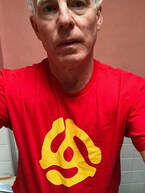Stale Bread and Coffee by g emil reutterReviewed by Charles Rammelkamp “Stale Bread and Coffee” Poetry, Alien Buddha Press, 2019 $10.50, 66 pages ISBN: 978-1093326017 Rooted in Philadelphia, g. emil reutter’s poems evoke a post-industrial America whose better times are in the rearview mirror. As the very title of the collection suggests, the joy has mostly gone cold, hard and musty. The title poem begins: He lives in a house in a neighborhood that has been forgotten. The only visitors are the mailman and the trash truck. He waits for the stale bread to toast reheats yesterday’s coffee, listens to the silent telephone. Bleak is the first word that comes to mind. Yet there is a strong bond to and love for Philadelphia, the “Cradle of Liberty,” where these poems take place. The first hint, for me, comes in the second poem, “Melting,” which conjures up a hot summer day in the city. The last line reads: “water ice dripped on the warm cement.” Water ice! The confection’s sold everywhere by streetcorner vendors, but I think only in Philadelphia does it go by that name, a frozen treat flavored with juices – cherry, mango, lemon, blueberry. Time and again, reutter locates these poems, “on the corner of 30th and Market,” “on the corner of 13th and Chestnut,” on Kensington Avenue in rugged North Philly, or in a memory of Roxborough High School. The poem “16 Miles” describes a commuter train “passing graffiti / scarred bridges, trash-covered banks / hurtles toward the turn of the Schuylkill / past the ivory of Penn into the temple of / the old railway gods.” The poem, “City of Brotherly Love” describes another sweltering summer day, “heat and ozone warnings / traffic jammed all day on the / twin bridges….” It’s another bleak picture as he ties the scene to a larger worldview: “It’s a day like any other day / soldiers die overseas in wars / with no direction….” Many of these poems take place in bars and diners. But the characters in reutter’s poems do not lead lives of quiet desperation, as Thoreau would have it, so much as they lead lives of quiet resignation. As he writes in “These Bones”: “I really don’t complain much / I am today, but I go on / It’s all I know how to do.” The poem, “November in a Diner” describes this attitude so vividly: Varicose veins hidden under knee highs 36 years walking this floor watching as young ones come and go she collects tips, works the hours, pulls the shifts slings plate after plate across the tables never a spill. The counter full of lonely old men…. Sounds bleak, but – no complaints from her either. The poem ends: “She counts her tips, rests her swollen / feet on the seat across from her.” Resigned to her fate. Yes, there is grief all over the place in these poems. Take “War Widow Cries Today,” for example, or the sad picture of an abandoned dilapidated house in “Of the Lost”; or the lament for that post-industrial America in “Something Wrong Here?” which concludes: “inside windowless buildings / that once were / America.” But there’s a tenderness throughout, too, for the people, the city, the nation, the poets in the bars, the waitress in the diner. Stale Bread and Coffee is fortifying – if not necessarily nutritious! As reutter concludes the poem, “Cards”: “smell / the coffee, taste the oatmeal, and / live the life dealt to you.” Biography Charles Rammelkamp is Prose Editor for BrickHouse Books in Baltimore and Reviews Editor for The Adirondack Review. A chapbook of poems, Jack Tar’s Lady Parts, is available from Main Street Rag Publishing. Another poetry chapbook, Me and Sal Paradise, was recently published by FutureCycle Press. An e-chapbook has also recently been published online Time Is on My Side (yes it is) –http://poetscoop.org/manuscrip/Time%20Is%20on%20My%20Side%20FREE.pdf Comments are closed.
|
Book ReviewsWelcome to KD's re-vamped blog, where you'll find book reviews by our editor Matthew Weddig. Archives
August 2023
Categories
All
|
- Home
- About
- Press
-
Issues
- Issue 51
- Issue 50
- Issue 49
- Issue 48
- Issue 47
- Issue 46
- Issue 45
- Issue 44
- Issue 43
- Issue 42
- Issue 41
- Issue 40
- Issue 39
- Issue 38
- Issue 37
- Issue 36
- Issue 35
- Issue 34
- Issue 33
- Issue 32
- Issue 31
- Issue 30
- Issue 29
- Issue 28
- Issue 27
- Issue 26
- Issue 25
- Issue 24
- Issue 23
- Issue 22
- Issue 21
- Issue 20
- Issue 19
- Issue 18
- Serenity
- Issue 17
- The Audio Room
- Issue 16
- Issue 15
- Issue 14
- Play It Again
- Issue 13
- Issue 12
- Issue 11
- Issue 10
- Issue 9
- Issue 8
- Issue 7
- Issue 6
- Hand to Mouth
- Issue 5
- Issue 4
- Issue 3
- Issue 2
- Issue 1
- Submissions
 RSS Feed
RSS Feed
